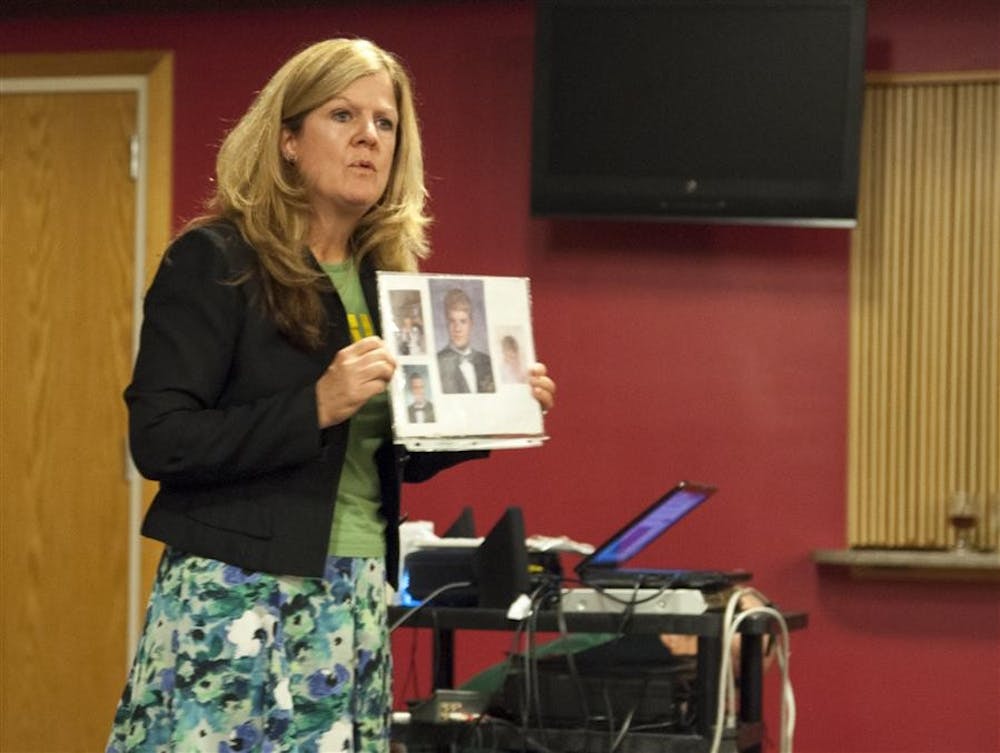Terri Steinberg considers herself a normal suburban housewife.
Steinberg shared her story of her son, Justin Wolfe, who was put on death row in 2002 after being accused of murder-for-hire in the death of Daniel Petrole Jr.
Steinberg shared her personal experience with the death penalty Monday evening at the Unitarian Universalist Church in Bloomington.
The Indiana Abolition Coalition and the church’s Prisoner Task Force organized the presentation, which aimed to educate people about the death penalty.
The goal of the Indiana Abolition Coalition is to build consensus to end the death penalty in Indiana through education, collaboration and activism, Dorris Parlette, director of the IAC said.
The death penalty is only available for the crime of murder in Indiana, according to the Indiana Public Defender Council’s website.
Parlette said the coalition believes people have some misconceptions on how the death penalty works.
“Our goal is getting the information out,” Parlette said. “The best way is to hear from people who have been personally and directly involved.”
Thirty-two states have the death penalty, according to deathpenaltyinfo.org
Steinberg said the death penalty is not a subject people normally like to talk about.
“I was a young mom with four young kids, I drove the minivan, I was a volunteer-aholic,” Steinberg said. “One day the death penalty came into my home and has threatened the life of my oldest child.”
Steinberg said when it all began, her son called and told her not to worry and said he would be home in a few days.
“It’s been 12 years, and he’s still not home,” Steinberg said. “Holidays and birthdays are always overshadowed by the fact that Justin isn’t here.”
Wolfe had never even been in a fist fight, Steinberg said. She said he was falsely accused of the murder-for-hire.
“I don’t see how people thought it would be okay to kill another human being to make up for the life Danny lost,” Steinberg said.
After 12 years, Steinberg and her family were on their way to pick up Wolfe, who was scheduled to be released. When the family was 45 minutes away from the prison, they were informed that Wolfe was actually not going to be let out.
“If you want a description of the words cruel and unusual, I had it in that car,” Steinberg said.
Steinberg said she will continue to hope.
“I hope people who hear his story realize that the choices you make would not only hurt you, but your brothers and sisters,” Steinberg said.
Therese Bartholomew, filmmaker and educator, said sometimes people forget the human side of crime, and storytellers help people understand the intimacy of crime.
Bartholomew’s brother, Stephen Leone was murdered in February 2003.
“I feel like my role since I lost my brother in 2003 is to help change a culture,” Bartholomew said. “I think part of abolishing the death penalty is shifting our culture and thinking and changing the world we live in.”
After seeing her brother’s murderer in court, Bartholomew said she was distraught by the feelings of forgiveness she felt for him.
Bartholomew said she spent seven years making a documentary showing the human side.
“We have a justice system that creates an abstract and I wanted to see the human, I wanted to see his humanity,” Bartholomew said. “However dirty and damaged and broken I want to sit in a room with it and I want him to see mine.”
Follow reporter Mary Hauber on Twitter @mary_hauber.
Activists discuss death penalty

Get stories like this in your inbox
Subscribe





